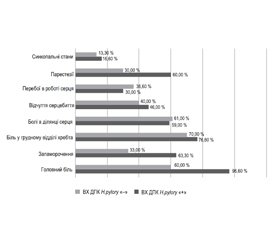Международный неврологический журнал Том 19, №6, 2023
Вернуться к номеру
Деякі неврологічні й лабораторні показники при виразковій хворобі дванадцятипалої кишки в стадії загострення залежно від наявності в пацієнтів Helicobacter pylori
Авторы: Ткаченко О.В., Демидас О.В.
Національний університет охорони здоров’я України імені П.Л. Шупика, м. Київ, Україна
Рубрики: Неврология
Разделы: Клинические исследования
Версия для печати
Соматоневрологічні й психосоматичні взаємозв’язки є невід’ємною частиною патофізіологічних механізмів при численних захворюваннях. Наведено результати одного з фрагментів комплексного клініко-параклінічного дослідження показників стану нервової системи при виразковій хворобі дванадцятипалої кишки (ВХ ДПК) у стадії загострення, метою якого було визначення впливу наявності в пацієнтів Helicobacter pylori (H.pylori) на неврологічні й лабораторні показники. Обстежено 60 осіб, середній вік яких становив 39,80 ± 1,29 року. Пацієнти були поділені на дві групи за ознакою наявності чи відсутності у них інфекції H.pylori. Комплекс обстеження включав: аналіз скарг за розробленим опитувальником, обстеження неврологічного статусу, аналіз вегетативної дисфункції (за опитувальником О.М. Вейна), лабораторне дослідження загального аналізу крові, С-реактивного білка, рівня загального холестерину, сечовини й креатиніну крові, розрахунок індексів NLR і PLR. Для обробки даних були використані відповідні статистичні методи. Встановлено, що скарги на головний біль, запаморочення та парестезії, а також астенодепресивний синдром і синдром полінейропатії різного ступеня вираженості з різним набором клінічних проявів вірогідно частіше (р < 0,05) були в пацієнтів з ВХ ДПК у стадії загострення за наявності в них Н.pylori. При ВХ ДПК у стадії загострення симпатикотонія вірогідно частіше, а ейтонія — вірогідно рідше мала місце в інфікованих Н.pylori пацієнтів. Вірогідно частіше за наявності в обстежених H.pylori зустрічався підвищений рівень С-реактивного білка. Виявлені неврологічні й лабораторні особливості вказують на ймовірне патофізіологічне значення H.pylori в соматоневрологічних взаємозв’язках, зокрема при ВХ ДПК.
Somatic-neurological and psychosomatic relationships are an integral part of the pathophysiological mechanisms in numerous diseases. The results of one of the fragments of a comprehensive clinical and paraclinical study of the nervous system state indexes in active duodenal ulcer (DU) are reported. It aimed to assess the effect of Helicobacter pylori (H.pylori) on clinical-neurological and laboratory indexes. Sixty persons with an average age of 39.80 ± 1.29 years were examined. The patients were divided into two groups based on H.pylori presence or absence. The examinations included the following: analysis of complaints according to the developed questionnaire, neurological status assessment, autonomic dysfunction analysis (by A.M. Vayn questionnaire), complete blood count, evaluating the levels of C-reactive protein, total cholesterol, urea and creatinine in blood, neutrophil-to-lymphocyte and platelet-to-lymphocyte ratio calculation. The appropriate statistical methods were used for data processing. It was found that complaints of headache, dizziness and paresthesia as well as asthenodepressive syndrome and polyneuropathy of various severity and with different clinical manifestations were more common (p < 0.05) in patients with active DU on the background of Н.pylori. Sympathicotonia was significantly more frequent and eutonia was significantly less frequent in the active DU in patients infected with Н.pylori. An increased C-reactive protein level was significantly more common in Н.pylori patients. The identified neurological and laboratory features indicate a probable pathophysiological significance of Н.pylori in somatoneurological relationships, particularly in DU.
клініко-неврологічні характеристики; виразкова хвороба дванадцятипалої кишки; Helicobacter pylori; вегетативна дисфункція; лабораторні показники
clinical and neurological characteristics; duodenal ulcer; Helicobacter pylori; vegetative dysfunction; laboratory indexes

